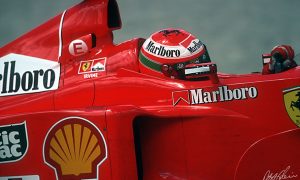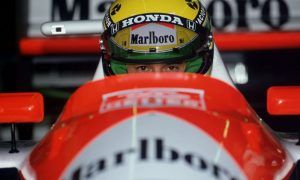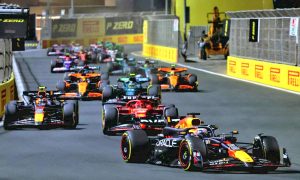
Let’s come up to the present day, we’ve got Daniel Ricciardo driving around with that head protection windscreen and you’re famous for that huge Melbourne crash when you destroyed the Jordan and ran back to the garage to jump into the spare and you’ve got a son who races: how do you feel about F1’s desire to push safety to degrees that are maybe impossible to achieve and how does the safety aspect of the sport sit with you?
I’m not comfortable with the way it’s heading really. You don't want to see unnecessary injury or death, but part and parcel of why people give up their time and hard earned cash to stand at the side of the track is because they are watching people doing something they couldn’t or wouldn’t want to do themselves. And a large part of that, apart from the speed and the skill is the danger. And now of course it should not be unnecessarily dangerous, but for me a single-seater racing car is open wheel and open cockpit as a core fact. If not we should go sports car racing, but even those cars have their risks. You look at the latest sports cars with their energy recovery systems and the drivers cannot get out of the passenger door: if they’re upside down, they’re horrible things to get out of.
I see these canopies or halos and I think there will be a situation where a driver doesn’t see something, can’t see a marshal’s flag or post, can’t see the start lights, can’t get out of the car fast enough. Like Fernando probably wouldn't have got out of the car (after his Melbourne crash this year) with either of those two devices because truth be told, like me when I had my Australian GP crash, he fell out of a tiny gap between the front of the cockpit and what was left from the angle of the rollover bars. But it’s irrelevant what I think about this, because now we’ve shown we’ve got it, the sport’s legal beagles will insist it gets put on because now, if somebody gets killed or seriously injured then the sport will be in for the high jump because the claim will be made that, “you had a solution, but you didn’t fit it.” So it will be going on (the cars) and it’s a horror story. You can’t see the driver. I love MotoGP because I can see the riders ride their bikes, you can see them work and slide the bike around. Very few people are aware that around the same Silverstone track layout, Valentino Rossi is 29 seconds slower than Lewis Hamilton. You’re comparing two great champions but Valentino is 29 seconds a lap slower because they don’t have downforce on motorbikes.
I absolutely echo Lewis’s comments earlier this weekend, saying there needs to be an element of risk in this business. Risk is part and parcel of the sport and if you’re not prepared to take that risk, don’t get in the car.

It’s politically incorrect to say people watch something because there’s a risk of someone getting hurt, but that’s a fact. The average punter can’t understand the skill involved in driving a Formula 1 car, but he can understand the danger.
We know full well that this type of device will have a horrific effect on the aerodynamics of the car and then you’ve got visibility issues, for example what would happen in the Singapore night race if it rains? Or how will you see Eau Rouge through the beam at the top? I know what it’s like in a sports car or a touring car, because you start adjusting the sun screen to see Eau Rouge as you start going down the hill, because it’s horrible not to see a corner properly. What is the logical conclusion to this process? For me, it’s driverless racing cars. If you said to all the drivers to finish the thread I was on, right it’s an optional halo, none of them would run it, because it’s heavy, around 8 kilos and aerodynamically it’s horrific. Of course they wouldn’t run it, they’d take the risk. I even wonder, if you take it further and imagine you can’t have seat belts, I’m not sure how many of them would start the race.
Seat belts were only introduced in the Sixties. Back then you were either going to burn to death, or get crumpled to death or get thrown out the car. That was wholly unacceptable. Now I think the cars are safe enough, I really do. There’s been a huge amount of work done on the tracks and the cars. Then people can say to me that my argument is flawed, because if I didn’t want any change then this sport wouldn’t be in the safe position it is now. Would I have survived my ’96 crash in an older car? Probably not. I come back to my point: if there’s no risk, motor sport loses a huge element of its appeal, also in terms of the thrill of driving and the thrill of watching it. So with managed risk like we have now, it’s absolutely fine. And if you don’t want to take the risk then don’t get in it.

©CahierArchive
We hear ifs and buts from F1 drivers and despite the fact you went up against Senna, you were Michael Schumacher’s team-mate but I never heard you bang on about how you could have been world champion and would have won this or that race but for some problem or other. Is that in your nature?
No its not. It pains me looking back, because I underperformed compared to my potential. In head to head battles I matched or beat Senna, Schumacher and [Mika] Hakkinen, who were for me the three strongest drivers in my era as an international racing driver. In a Sports Car, I think I was pretty much unbeatable. (Martin is a World Sports Car Champion and a Le Mans 24 Hours winner) I had the speed. It didn’t help when I smashed my legs up in the middle of the first season. (In the 1984 Dallas GP Brundle broke both his feet and ankles.) It dramatically changed the course of my career, as I never quite recovered from it, especially when left foot braking became a necessity, I just couldn’t do it. I didn’t have the ability to do it.
You can only rate yourself on what you have done. I don’t think anybody in this paddock or who watched the races would argue with the fact that I had the ability to win races. Whether I had the head and the potential to win a championship, I don’t know. So you could say that even by saying that, then I clearly didn’t. If you’re not a hundred percent cocksure of yourself then you clearly don’t have it. I’m being realistic about it. What I do know is that, on the day when I was the man in the right car like Canada ‘92, the diff failed. The day I was the king of the castle on one of the only days I had a car capable of winning, I had a mechanical failure. The other one was Spa ’92 when Michael won and I came in a lap too late to change to slicks. I torment myself about it, as I had made that decision at the pit entry to stay out, mainly because Michael had gone off in front of me and I was now P3 and catching the Williams and I’m thinking Michael’s gone off, so leave it one more lap. He came in because he’d gone off down the grass and he won the race. So one was a judgement call and one was reliability. Other than that, I never threw away a race away that I should have won. So clearly, I didn’t navigate myself into the best cars. But it also tells you that I didn’t put myself in a winning position often enough, at which point the inevitable wheel of fortune would give me some victories. That frustrates me.
But you’re still driving current machinery, still involved in the sport you love, still having a great time.
Yep.
Click here for more from Eric Silbermann's breakfasts in the paddock
Romain Grosjean column: Haas brought back down to earth
Keep up to date with all the F1 news via Facebook and Twitter






